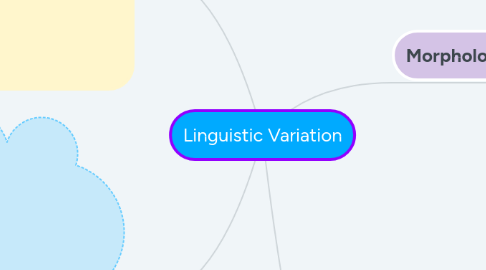
1. Morphological Variation
1.1. It is the adaptation or elimination of new words according to the different arias and fields.
1.1.1. Inflectional Morphenes
1.1.2. Technological prefixes
1.1.3. The reduction Phenomenon
1.1.4. Examples
1.1.4.1. 1. I wanna go see "Godzilla vs. Kong".
1.1.4.2. 2: iBook; iMovie; iPhone.
1.1.4.3. 3. Old English: Sellan; Modern English: to sell.
1.1.4.4. 4. You should be gonna hang out with that girl.
1.1.4.5. 5. Virtual-class; virtual-games; virtual-life; virtual-world.
1.2. Lexical Variation
1.2.1. It refers to the vocabulary. Creating of a new word and to change the meaning. The suffixes and prefixes support the creation of new words.
1.2.1.1. EXAMPLES:
1.2.1.1.1. Useless
1.2.1.1.2. Unbelievable
1.2.1.1.3. Development
1.2.1.1.4. Room-Roommate
1.2.1.1.5. Accountant-Accounting
1.2.2. CREATING NEW WORDS
1.2.2.1. Word coinage
1.2.2.1.1. ASPIRIN
1.2.2.2. Words from names
1.2.2.2.1. FRANKFURT sausages
1.2.2.3. Blending
1.2.2.3.1. MOTOR + HOTEL = MOTEL
1.2.2.4. Reduction
1.2.2.4.1. TELEPHONE = PHONE
1.2.2.5. Borrowing or Loan
1.2.2.5.1. BREAK
1.2.2.6. American - England
1.2.2.6.1. HOLIDAY - VACATION
2. Semantical Variation
2.1. It refers all to the interpretation, meaning, linguistic signs such as symbols, words, expressions or formal representations.
2.1.1. EXAMPLES
2.1.1.1. Please, shut down the door! Thiago Can you shut down the competer?
2.1.1.2. Block for toy and Block when you need an address.
2.1.1.3. Bank building where you can save your money and Bank the land alongside to a river o lake.
2.1.1.4. RUN: a journey accomplished or route taken by a vehicle, aircraft, or boat, especially on a regular basis. RUN:move at a speed faster than a walk, never having both or all the feet on the ground at the same time.
3. Syntatical Variation
3.1. Syntactic variation deals with the ways in which sentences are structured and constructed.
3.1.1. A child could be called a child, kid, boy, girl.
3.1.2. EXAMPLES
3.1.2.1. OLD ENGLISH: -The wife´s tale of bath. MODERN ENGLISH: -The wife of bath´s tale.
3.1.2.2. -Ferde he -He traveled
3.1.2.3. When I was young, I lived in a small hus. When I was young, I lived in a small house.
3.1.2.4. Old English: Swestor and brodor; Modern English: Sister and Brother.
3.1.2.5. -Thanne longen folk to goon on ilgrimages. - Then folk long to go on pilgrimages.
